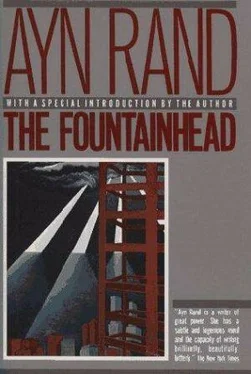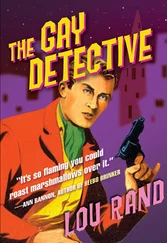When they met in the building, Scarret looked at him expectantly, with an entreating, tentative half-smile, an eager pupil waiting for the teacher's recognition of a lesson well learned and well done. Wynand said nothing. Scarret ventured once:
"It was clever, wasn't it, Gail?"
"Yes."
"Have any idea on where we can milk it some more?"
"It's your job, Alvah."
"She's really the cause of everything, Gail. Long before all this. When you married her. I was afraid then. That's what started it. Remember when you didn't allow us to cover your wedding? That was a sign. She's ruined the Banner. But I'll be damned if I don't rebuild it now right on her own body. Just as it was. Our old Banner."
"Yes."
"Got any suggestions, Gail? What else would you like me to do?"
"Anything you wish, Alvah."
A TREE BRANCH hung in the open window. The leaves moved against the sky, implying sun and summer and an inexhaustible earth to be used. Dominique thought of the world as background. Wynand thought of two hands bending a tree branch to explain the meaning of life. The leaves drooped, touching the spires of New York's skyline far across the river. The skyscrapers stood like shafts of sunlight, washed white by distance and summer. A crowd filled the county courtroom, witnessing the trial of Howard Roark.
Roark sat at the defense table. He listened calmly.
Dominique sat in the third row of spectators. Looking at her, people felt as if they had seen a smile. She did not smile. She looked at the leaves in the window.
Gail Wynand sat at the back of the courtroom. He had come in, alone, when the room was full. He had not noticed the stares and the flashbulbs exploding around him. He had stood in the aisle for a moment, surveying the place as if there were no reason why he should not survey it. He wore a gray summer suit and a panama hat with a drooping brim turned up at one side. His glance went over Dominique as over the rest of the courtroom. When he sat down, he looked at Roark. From the moment of Wynand's entrance Roark's eyes kept returning to him. Whenever Roark looked at him, Wynand turned away.
"The motive which the State proposes to prove," the prosecutor was making his opening address to the jury, "is beyond the realm of normal human emotions. To the majority of us it will appear monstrous and inconceivable."
Dominique sat with Mallory, Heller, Lansing, Enright, Mike — and Guy Francon, to the shocked disapproval of his friends. Across the aisle, celebrities formed a comet: from the small point of Ellsworth Toohey, well in front, a tail of popular names stretched through the crowd: Lois Cook, Gordon L. Prescott, Gus Webb, Lancelot Clokey, Ike, Jules Fougler, Sally Brent, Homer Slottern, Mitchell Layton.
"Even as the dynamite which swept a building away, his motive blasted all sense of humanity out of this man's soul. We are dealing, gentlemen of the jury, with the most vicious explosive on earth — the egotist!"
On the chairs, on the window sills, in the aisles, pressed against the walls, the human mass was blended like a monolith, except for the pale ovals of faces. The faces stood out, separate, lonely, no two alike. Behind each, there were the years of a life lived or half over, effort, hope and an attempt, honest or dishonest, but an attempt. It had left on all a single mark in common: on lips smiling with malice, on lips loose with renunciation, on lips tight with uncertain dignity — on all — the mark of suffering.
" ... In this day and age, when the world is torn by gigantic problems, seeking an answer to questions that hold the survival of man in the balance — this man attached to such a vague intangible, such an unessential as his artistic opinions sufficient importance to let it become his sole passion and the motivation of a crime against society."
The people had come to witness a sensational case, to see celebrities, to get material for conversation, to be seen, to kill time. They would return to unwanted jobs, unloved families, unchosen friends, to drawing rooms, evening clothes, cocktail glasses and movies, to unadmitted pain, murdered hope, desire left unreached, left hanging silently over a path on which no step was taken, to days of effort not to think, not to say, to forget and give in and give up. But each of them had known some unforgotten moment — a morning when nothing had happened, a piece of music heard suddenly and never heard in the same way again, a stranger's face seen in a bus — a moment when each had known a different sense of living. And each remembered other moments, on a sleepless night, on an afternoon of steady rain, in a church, in an empty street at sunset, when each had wondered why there was so much suffering and ugliness in the world. They had not tried to find the answer and they had gone on living as if no answer were necessary. But each had known a moment when, in lonely, naked honesty, he had felt the need of an answer.
" ... a ruthless, arrogant egotist who wished to have his own way at any price ... "
Twelve men sat in the jury box. They listened, their faces attentive and emotionless. People had whispered that it was a tough-looking jury. There were two executives of industrial concerns, two engineers, a mathematician, a truck driver, a bricklayer, an electrician, a gardener and three factory workers. The impaneling of the jury had taken some time. Roark had challenged many talesmen. He had picked these twelve. The prosecutor had agreed, telling himself that this was what happened when an amateur undertook to handle his own defense; a lawyer would have chosen the gentlest types, those most likely to respond to an appeal for mercy; Roark had chosen the hardest faces.
" ... Had it been some plutocrat's mansion, but a housing project, gentlemen of the jury, a housing project!"
The judge sat erect on the tall bench. He had gray hair and the stern face of an army officer.
" ... a man trained to serve society, a builder who became a destroyer ... "
The voice went on, practiced and confident. The faces filling the room listened with the response they granted to a good weekday dinner: satisfying and to be forgotten within an hour. They agreed with every sentence; they had heard it before, they had always heard it, this was what the world lived by; it was self-evident — like a puddle before one's feet.
The prosecutor introduced his witnesses. The policeman who had arrested Roark took the stand to tell how he had found the defendant standing by the electric plunger. The night watchman related how he had been sent away from the scene; his testimony was brief; the prosecutor preferred not to stress the subject of Dominique. The contractor's superintendent testified about the dynamite missing from the stores on the site. Officials of Cortlandt, building inspectors, estimators took the stand to describe the building and the extent of the damage. This concluded the first day of the trial.
Peter Keating was the first witness called on the following day.
He sat on the stand, slumped forward. He looked at the prosecutor obediently. His eyes moved, once in a while. He looked at the crowd, at the jury, at Roark. It made no difference.
"Mr. Keating, will you state under oath whether you designed the project ascribed to you, known as Cortlandt Homes?"
"No. I didn't."
"Who designed it?"
"Howard Roark."
"At whose request?"
"At my request."
"Why did you call on him?"
"Because I was not capable of doing it myself."
There was no sound of honesty in the voice, because there was no sound of effort to pronounce a truth of such nature; no tone of truth or falsehood; only indifference.
The prosecutor handed him a sheet of paper. "Is this the agreement you signed?"
Keating held the paper in his hand. "Yes."
Читать дальше










